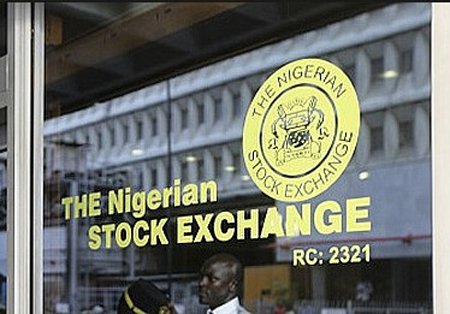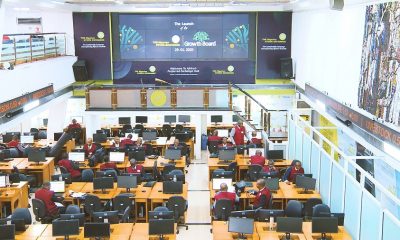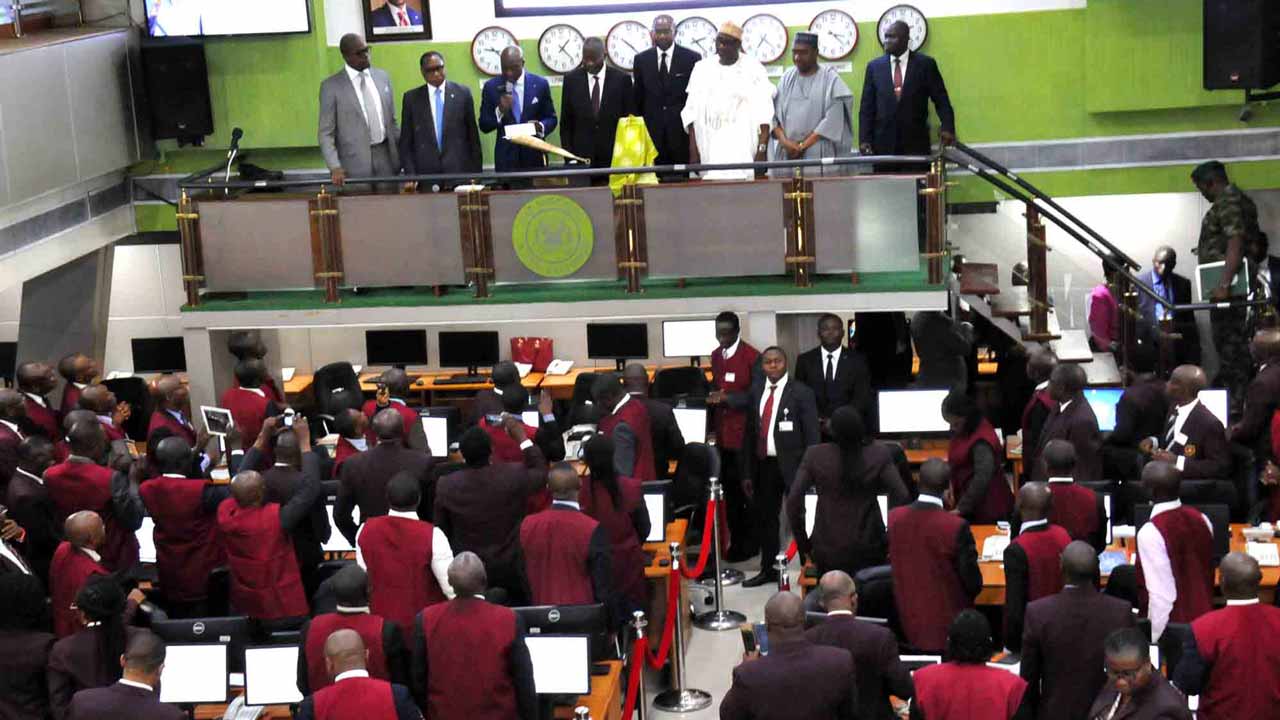NEWS
Nigerian Equities Down As Global Stock Market Plunges

Nigerian equities declined for the second consecutive trading session yesterday as investors stepped up profit-taking amidst concerns that global equities slowdown may negatively impact the domestic market.
Most advanced and emerging global markets have witnessed contractions in recent days.
With nearly three losers for every gainer, the benchmark index at the Nigerian Stock Exchange (NSE) showed average decline of 0.87 per cent yesterday, equivalent to net capital loss of N138 billion. Nigerian equities had lost N135 billion on Monday.
The sustained decline moderated the average year-to-date return to 14.73 per cent, which also reflected the market-wide decline in returns across sectors.
US stock markets swung rapidly yesterday amid frantic Wall Street trading triggered by earlier losses.
Shares opened about two per cent down, and have shuttled in between positive and negative territory throughout the day.
The Dow Jones and Nasdaq are now nearly two per cent ahead, while the S&P 500 is up by nearly one per cent.
Investors are fretting over the prospect of rising interest rates, which push up borrowing costs for companies and consumers.
The gyrations followed steep declines on Wall Street on Monday, which sparked a sell-off in Asia and Europe.
Analysts have been forecasting for months that the financial markets were due a correction after a long period of rising prices.
Earlier yesterday, markets in London, Frankfurt and Paris had initial losses of up to three per cent, before recovering some ground. Japan’s Nikkei 225 closed down 4.7 per cent.
The steep sell-off began last week after data in the US showed stronger than expected wage growth.
The report came amid other shifts, including new tax cuts, trade tensions, and a sinking dollar, that analysts say could lead inflation to rise faster than expected.
The conditions pose a challenge for the Federal Reserve, which will need to raise interest rates to counter inflation without moving so aggressively that it severely curbs economic activity.
London’s FTSE 100 closed down almost 200 points or 2.6% at 7141. Frankfurt’s Dax and Paris’s CAC were down 2.3% and 2.4% respectively.
On Monday the FTSE 100 closed at its lowest level since April of last year.
The falls follow some good years for investors.
In 2017 the Dow in the US was up 25% and London’s FTSE 100 rose 7.6%
Stock markets around the world are falling, driven by fears coming out of the United States (U.S).
Major indexes in New York, Tokyo and London have suffered steep losses. And a key gauge of investors’ fear spiked to its highest level in more than two years.
Analysts are trying to figure out if it’s a short-term correction for markets that had recently hit record highs or a sign of deeper concerns.
Markets in Asia and Europe were falling yesterday. Japan’s Nikkei plunged 4.7 per cent, Hong Kong stocks plummeted 5.1 per cent and London’s FTSE 100 was down nearly two per cent.
The U.S. is the world’s largest economy and home to the biggest financial markets on the planet. The dollar is the currency of reference for investors around the world.
What happens on Wall Street almost inevitably ripples around the globe. Markets in other global financial centers, such as London and Tokyo, are particularly sensitive to it.
But more closed systems, such as China, are often less heavily affected. Stocks in Shanghai have been down 2.2 per cent since Thursday compared with eight per cent in Tokyo.
How worried should you be?
It depends who you ask. But assuming the current stock market declines are a short-term drop rather than a sign of deeper problems, financial experts generally say you shouldn’t panic.
Even if stocks continue to decline over the next few days, market corrections are normal, Greg McBride, Bankrate.com’s chief financial analyst, said.
The U.S. and other major economies are growing healthily at the moment.
CEO of Gerber Kawasaki Wealth and Investment Management, Ross Gerber, said on CNN: “I caution investors to really be patient here and look for opportunities and not to panic. It’s really not a time to be worried about the long-term prospects of the market.”
The Trump connection
The plunging stock market is awkward for President Trump. He’s frequently taken credit for the big run-up in U.S. share prices during his presidency.
“It’s a risky game to talk about the markets. But it seems like Trump is going to live or die by the stock market,” said Greg Valliere, chief global strategist at Horizon Investments.
The White House said in a statement that Trump was focused on “our long-term economic fundamentals, which remain exceptionally strong.” The statement cited strengthening economic growth, low unemployment and increasing wages for workers.
But some of Trump’s policies also feed into the concerns weighing stocks at the moment.
The recent huge tax cuts for businesses were initially cheered by investors. But they also prescribed expensive medicine to an already healthy U.S. economy.
Stimulating a strong economy could be too much of a good thing. Morgan Stanley warned in the fall that “overheating” the economy may backfire by causing stocks to “boom then bust.”
And the current stresses in the bond market reflect the concerns that the U.S. Treasury needs to take on more debt to pay for the tax cuts.







